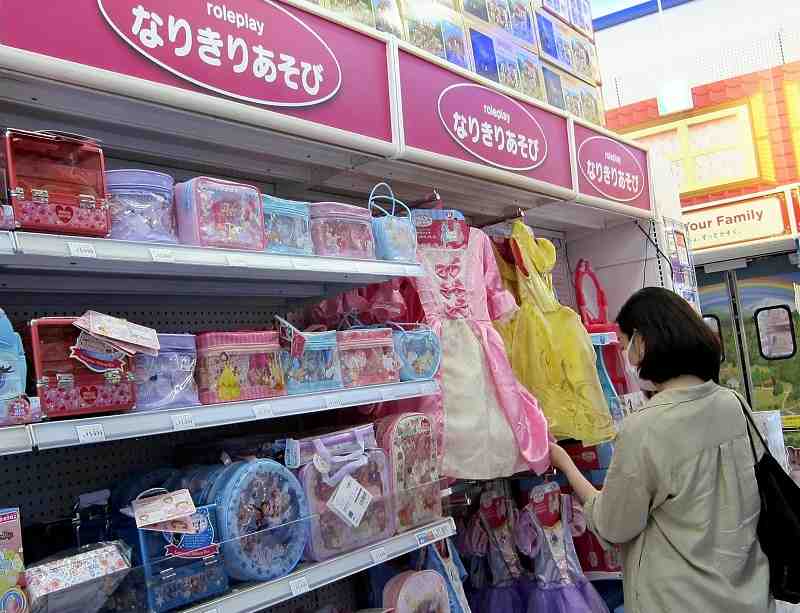
At the Toys“R”Us Odaiba store in Minato Ward, Tokyo, the section that was previously labeled with a “Girls’ toys” sign now has a “Pretend play” sign.
1:00 JST, July 15, 2022
Children’s toys are becoming more and more gender neutral, with signs that read “For boys” or “For girls” disappearing from toy stores. Shelves are being stocked with new products suitable for both boys and girls. And an environment is being created where children no longer have to give up the play activities they like because of their gender.
In February, 18 different toys, including a doll, a dollhouse and shogi, or Japanese chess, were brought to a class of 4-year-olds at the Sakura certified childcare facility in Tochigi City to observe the differences in how boys and girls play.
“That’s for girls,” a boy said while looking at a doll and a dollhouse. The boys initially looked at these toys from a distance. Two weeks later, there was a major change. Boys played doctor with the doll as their patient and made a house for the doll with cardboard. There was no difference in the types of toys chosen by boys and girls or how they played.
“When there is an environment where they can play freely and safely, boys and girls play in a similar way,” said Masahiro Hori, the director of the preschool.
The project was conducted for a period of 11 weeks by Kokoruku, an organization that promotes ways to get children thinking about the U.N.-adopted Sustainable Development Goals, and People Co., a toy manufacturer.
To avoid giving the impression that some toys are for boys and others are for girls, the toys were shown to the children after their packaging was removed.
“When giving toys to children, it should be done carefully such that adults’ established views on gender will not influence them,” an official of People said.
The toy industry, which conventionally categorizes products based on target users’ gender, has started to reassess this business practice.
Toys“R”Us-Japan, Ltd., which runs about 160 stores across Japan, decided to stop using such signs as “Boys’ toys” and “Girls’ toys” in its sales areas. Since last year, they have gradually been replaced with such signs as “roleplay” that focus on the types of toys.
The move is being driven by criticism that gender-based categorizations are at odds with the times and narrow consumer options.
To obtain information on consumers’ experience with gender distinctions, a joint survey was conducted this year by Kodomo Living, which publishes a childcare information magazine, and the Dentsu Diversity Lab. The survey covered 681 parents with children ranging from less than 1 year old to sixth graders in elementary school.
About a quarter, 24.5%, of respondents said that they had at some point not bought a product because they viewed it as unsuitable for their child’s gender, even though their child wanted it.
Concerning the types of products not purchased, toys accounted for the largest percentage, at 53.3%, with multiple answers allowed.
“When there are gender category signs in stores, people tend to select products under the influence of those signs,” an official of the Dentsu Diversity Lab said.
Toy manufacturers are also thinking hard about what they can do.
In 2019, Bandai Co. released Horen, a boy baby doll. The company uses boys in the product’s advertisements and for promotional purposes to stress that playing with dolls can be fun for both boys and girls.
Pilot Corp. has added a boy doll to its Mel-chan playing doll series.
In response to the view that pink packaging makes it hard for boys to say they want the dolls, the company has mainly used light blue since 2016.
Daisuke Fujii, editor-in-chief of Toy Journal, a monthly industry journal, expressed his hopes for the transition, saying, “If toys become gender neutral, it will contribute to an expanding market and children will be able to learn about gender equality through toys.”
Fujii also said that many consumers still do conventional gender-specific shopping, such as looking for a toy “suited to my grandson who is 8 years old.”
“To deal with the matter, the entire industry needs to think hard about how to create an easy-to-shop environment and meet the wide range of consumer needs,” Fujii said.
Understanding vital for growth
For children to be able to play freely with their favorite toys without worrying about conventional gender distinctions, it is essential that people around them be understanding.
This point is illustrated by a survey conducted with parents and children last year by the Danish toy manufacturer Lego Group, with a total of 6,844 respondents in seven countries including Japan and the United States.
The survey showed that roughly 70% of boys were worried that they would be made fun of by others if they played with toys that are traditionally associated with girls. The percentage for a similar question posed to girls was 40%.
Tamagawa University Prof. Hirotomo Omameuda said: “Using such expressions as ‘because you are a boy’ or ‘even though you are a girl’ will not only dampen children’s interest and fun playing but also hurt their feelings and discourage them from picking some toys.”
Omameuda said that when such expressions are used by children during play together, childcare workers and other adults need to help them correct this way of thinking by explaining that there are diverse values.
He also said: “Adults should be attentive to the interests and concerns of each child, rather than acting based on a stereotype that playing with dolls and playing house are for girls and playing with plastic toy blocks is for boys.”
Top Articles in Society
-

Man Infected with Measles Reportedly Dined at Restaurant in Tokyo Station
-

Man Infected with Measles May Have Come in Contact with Many People in Tokyo, Went to Store, Restaurant Around When Symptoms Emerged
-

Woman with Measles Visited Hospital in Tokyo Multiple Times Before Being Diagnosed with Disease
-

Australian Woman Dies After Mishap on Ski Lift in Nagano Prefecture
-

Foreign Snowboarder in Serious Condition After Hanging in Midair from Chairlift in Nagano Prefecture
JN ACCESS RANKING
-

Japan PM Takaichi’s Cabinet Resigns en Masse
-

Japan Institute to Use Domestic Commercial Optical Lattice Clock to Set Japan Standard Time
-

Israeli Ambassador to Japan Speaks about Japan’s Role in the Reconstruction of Gaza
-

Man Infected with Measles Reportedly Dined at Restaurant in Tokyo Station
-

Man Infected with Measles May Have Come in Contact with Many People in Tokyo, Went to Store, Restaurant Around When Symptoms Emerged





















